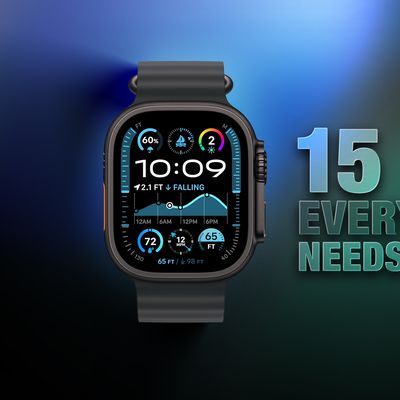EU Likely to Charge Apple With Anti-Competitive Behavior This Week
The European Commission will this week bring charges against Apple over concerns that its App Store rules break EU competition law, reports the Financial Times. The charges relate to a two-year-old antitrust dispute with Spotify.

Margrethe Vestager, the EU's competition chief, will late this week publicly issue charges against Apple over concerns that the rules it sets for developers on its App store break EU law, according to several people with direct knowledge of the announcement.
In 2019, Spotify filed a complaint with the European Commission, alleging that Apple enforces App Store rules that "purposely limit choice and stifle innovation at the expense of the user experience," accusing the company of "acting as both a player and referee to deliberately disadvantage other app developers."
Spotify highlighted that Apple's 30% commission on App Store purchases, including in-app subscriptions, forces the music streaming service to charge existing subscribers $12.99 per month for its Premium plan on the App Store, just to collect the $9.99 per month it usually charges.
Spotify argues this gives Apple an unfair advantage because it's unable to compete with Apple Music's standard $9.99 per month price within the App Store.
The Spotify antitrust case is one of several opened by the European Commission into Apple's business practices in June last year. It's not yet known what the EU's charges could involve, but Apple could be forced to pay a fine or make changes to its App Store business model in Europe to foster greater competition.
Last month, Reuters reported that EU regulators were in the process of finalizing a charge sheet against Apple in related to Spotify's antitrust complaint, while FT's sources warned that the timing of the charge could still slip. Apple has denied allegations of anti-competitive behavior, and said at the time of Spotify's complaint that its rival was using "its financial motivations in misleading rhetoric."
Popular Stories
Apple is looking for a "breakthrough" with its push into wearable AI devices, including an "AirTag-sized pendant," according to Bloomberg's Mark Gurman.
In a report this week, he said the pendant is reminiscent of the failed Humane AI Pin, but it would be an iPhone accessory rather than a standalone product.
The pendant would feature an "always-on" camera and a microphone for Siri voice...
Apple Watch is now eleven generations in, and packed with useful features that are easy to miss at first glance. To help you get more out of your new device, we've rounded up 15 practical tips you might not have discovered yet, including a few that long-time users often overlook.
Bounce Between Two Apps
On your Apple Watch, double-press the Digital Crown to see a deck of all currently...
Apple's iPhone development roadmap runs several years into the future and the company is continually working with suppliers on several successive iPhone models at the same time, which is why we often get rumored features months ahead of launch. The iPhone 18 series is no different, and we already have a good idea of what to expect for the iPhone 18 Pro and iPhone 18 Pro Max.
One thing worth...
New trade-in data indicates that Apple's iPhone 17 Pro Max has rapidly become the single most traded-in smartphone.
According to a new report from SellCell, Apple's latest flagship iPhone has quickly risen to the top of the independent trade-in market, accounting for 11.5% of all devices appearing in the top-20 trade-in rankings just months after release. The analysis is based on SellCell...
Apple will announce its rumored low-cost MacBook at its event on March 4, with the device coming in a selection of bold color options, according to a known leaker.
Earlier this week, Apple announced a "special Apple Experience" for the media in New York, London, and Shanghai, taking place on March 4, 2026 at 9:00am ET.
Posting on Weibo, the leaker known as "Instant Digital" said that the...





















